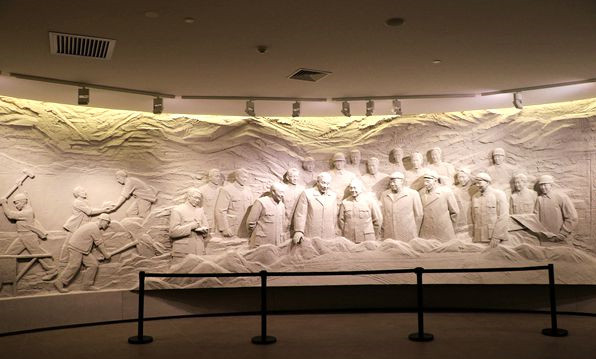Economists look at past, future of reform and opening up

The picture shows statues concerning reform and opening up at the Shekou Reform and Opening Up Museum. Located in Nanshan District in Shenzhen, Shekou is where the reform and opening up campaign started.
2018 marks the 40th anniversary of China’s reform and opening up. Economists recently gathered in Shanghai to review the implementation of the policy and discuss how to carry it through at the new historical juncture.
Held on Jan. 13, the 12th Shanghai Young Economists Forum was themed “40 Years of Reform and Opening Up and Socialist Political Economics with Chinese Characteristics.”
The decision to launch the nationwide reform and opening up campaign was made at the Third Plenary Session of the 11th CPC Central Committee in late 1978, which ushered in a new development epoch for China.
Through reform and opening up, China found a development path suited to national conditions, said Zhang Jun, dean of the School of Economics at Fudan University. With the aims of emancipating productive forces and improving people’s living standards, it started with incremental reform to fully motivate all parties for the sake of economic growth.
Citing China as an enormous economy with vast regional disparities, Zhang pointed out the need to incentivize basic economic units, including counties, cities and provinces, to take the initiative, therefore injecting momentum into economic transformation and development.
From fiscal decentralization in the 1980s to tax sharing reform in the 1990s, China has grasped the point of motivating local authorities, Zhang said.
“The vitality unleashed by economic system reform has been critical to the growth miracles achieved by the Chinese economy over the past four decades,” said Shen Kaiyan, head of the Institute of Economics at the Shanghai Academy of Social Sciences.
In the last 40 years, the CPC has tailored economic policies to the internal and external environment of different periods, constantly improving the socialist market economic system, Shen said.
From the Third Plenary Session of the 11th CPC Central Committee in 1978 to the 14th Party congress in 1992, China took on the task of addressing the inefficiencies of the planned economy system domestically. Externally, it gradually integrated into the global community. Under such internal and external circumstances, it prioritized systemic reform of the socialist market economy, Shen said.
From 1992 to the 17th CPC National Congress, institutional reform was based on the legitimate pursuit of wealth by various market entities while peace and development were made the theme of the times. Hence, the basic framework of the socialist market economic system was built to set the stage for enriching market allocation models, Shen said.
Reform and opening up since the 18th CPC National Congress has been carried out on the basis of market entities’ greater freedom to independently manage wealth, and China has opened further, allowing it to become more integrated into the international community, Shen added.
Advancing reform and development while striving to maintain social stability is another recipe for the success of reform and opening up. Zhou Zhenhua, chairman of the Shanghai Economist Association, said that in the last 40 years, China has consistently taken into consideration the momentum of reform, the speed of development and the resilience of the general public, properly handling the tripartite relationship.
Reform and opening up is and will be an ongoing cause. In the new era, financial reform and opening up is crucial to comprehensively deepening reform and building an open economic system. Since the 18th CPC National Congress, significant achievements have been made in this regard. Lian Ping, a chief economist at the Bank of Communications, said he expects new progress in interest rate liberalization, direct financing as well as improvements of indirect financing structure and governance of financial institutions.
The forum was co-hosted by the Shanghai Economist Association, the Development Research Center of the Shanghai Municipal People’s Government and the Shanghai Federation of Social Science Associations, and organized by the Faculty of Economics and Management at East China Normal University.
MAO LI and ZHA JIANGUO are correspondents with Chinese Social Sciences Today.
